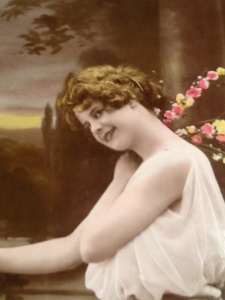Yesterday I asked you if you could explain what exactly was funny about the passage below.
Lottie Crump, proprietress of Shepheard’s Hotel, Dover Street, attended invariably by two Cairn terriers, is a happy reminder to us that the splendours of the Edwardian era were not entirely confined to Lady Anchorage or Mrs Blackwater [A pair of prattling valetudinarians introduced in an earlier chapter]. She is a fine figure of a woman, singularly unscathed by any sort of misfortune and superbly oblivious of those changes in the social order which agitate the more observant grandes dames of the period. When the war broke out she took down the signed photograph of the Kaiser and, with some solemnity, hung it in the men-servant’s lavatory; it was her one combative action; since then she has had her worries – income-tax forms and drink restrictions and young men whose fathers she used to know, who give her bad cheques, but these have been soon forgotten; one can go to Shepheard’s parched with modernity any day, if Lottie likes one’s face, and still draw up, cool and uncontaminated, great healing draughts from the well of Edwardian certainty.
The response was a puzzled silence, so I took the three sentences down to the lab for analysis. The passage was found to contain large levels of Waughsian irony. This irony was of three distinct types, and, for the benefit of would-be ironists, these are outlined below.
One: Parody
The first sentence is a parody of the style of the gossip column – the ‘society column’ as it was then known, of the popular newspapers of Waugh’s era. In fact, such a column plays a central role in the story of the novel – its protagonist is briefly employed to write one. The satire is directed at Lottie Crump, whose dissolute lifestyle hardly merits the breathless praise of such a column; it is also directed at the columns themselves, mocking of their cloying, familiar style (‘a reminder to us’) and their abundant clichés (‘the splendours of the Edwardian age’).
Two: Back-handed Compliments
When Waugh writes that Lottie is ‘superbly oblivious of those changes in the social order which agitate the more observant grandes dames of the period’ it appears to be a compliment: after all, ‘superbly’ is a positive modifier. But what is meant is that this woman is utterly out of touch with the present. It is rather a back-handed compliment. Coming from Waugh, mind, an anti-modern chap who thought modern society degenerate, this isn’t the worst of insults.
Three: The Mock-Heroic
‘[I]t was her one combative action,’ says Waugh of Lottie’ repositioning of the Kaiser’s painting. Actually, it was nothing of the sort: Lottie’s most painful action during the war was to have to relinquish her affection for the German monarch. A mock-heroic tone can be affectionate, raising small actions to the status of large ones for comic effect, but here it serves to remind us, very indirectly, that while men were dying in their thousands on the Western front, people like Lottie were had no worries greater than home decoration. Too bitter-making, Evelyn!
And there you are: three examples of irony in — oh, hang on… message just up from the lab: they have isolated a fourth strain of irony in the extract.
Four: Tongue-in-Cheek Metaphor
You might have thought, reaching the end of the extract, that Evelyn ends with a rather cheesy metaphor – ‘great healing draughts from the well of Edwardian certainty’ indeed. Well, how presumptuous you can be! Waugh knew this metaphor was corny and used it knowingly. He was gently ribbing the sort of people who want to escape from the present into an idealised version of the past, people like – well, like himself; there’s a significant trace of the mock-heroic here too – ‘cool and uncontaminated’ doesn’t much describe the strange and drunken hangers on who congregate in Lottie’s parlours – and if draughts of anything at all are being imbibed, it’s probably something alcoholic.

